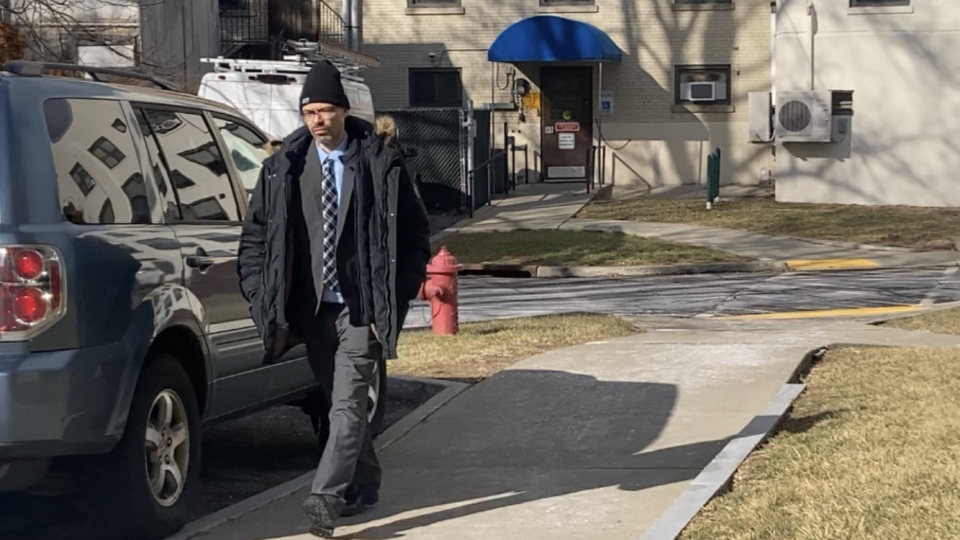Witness refuses to testify in Krivak case about conversation with sex offender
A witness who has claimed that a Connecticut sex offender made jailhouse admissions about the 1994 killing of 12-year-old Josette Wright in Putnam County refused to testify Tuesday as a defense witness in the trial of another man charged in the case.
Joseph Santoro invoked his Fifth Amendment right against self-incrimination at the retrial of Andrew Krivak. Out of the presence of the jury, Santoro said he would not answer any questions by the lawyers and Judge Robert Prisco, refusing even to be sworn in.
But whether the jury will hear Santoro's account of his conversation with sex offender Howard Gombert in the form of prior testimony he has given remains to be seen. Prisco on Wednesday will continue to hear legal arguments about that.

Coercion:Defense witness claims investigators coerced his account in Krivak case
Trial: Prosecution rests at Krivak retrial in 12-year-old Josette Wright's killing
The prosecution has assailed Santoro's credibility about the jailhouse conversation since he first revealed it in 2011. But that has intensified since the spring of 2021 when Santoro demanded more than $1 million from Krivak's lawyers not to recant his testimony about Gombert. He pleaded guilty to a federal extortion charge leveled against him after the lawyers notified the FBI.
Josette disappeared in Carmel in October 1994, and her remains were discovered more than 13 months later in the woods off Fields Lane in Patterson.
Krivak and his friend Anthony DiPippo, older teenagers at the time, were arrested in July 1996, on the basis of an eyewitness account from their friend Denise Rose, who claims to have watched them raping Josette in Krivak's van and dumping her body in the woods. Both men were convicted at separate trials the following year and sentenced to 25 years to life in prison.
The defense has long insisted that Rose's account was the product of details fed to her by Putnam County sheriff's investigators as they threatened she could be prosecuted herself.
DiPippo had his conviction overturned more than a dozen years later because his original lawyer had not revealed that he had previously represented Gombert.
Before he could be retried, Santoro upended the case in 2011 when he revealed his jailhouse conversation with Gombert earlier that year. He claimed that Gombert told him he had sex with Josette and that "two suckers" were doing time for what he had done.
DiPippo was found guilty a second time, but that conviction was thrown out because the defense had been precluded from calling Santoro and presenting other evidence implicating Gombert.
Santoro's testimony at DiPippo's third trial, in 2016, helped lead to a not-guilty verdict and the extortion plot five years later targeted some of the $12 million DiPippo received as a settlement for his federal lawsuit against Putnam County.
His similar testimony at a 2019 hearing was the basis for Krivak's conviction being overturned, setting the stage for the current retrial.
Having already pleaded guilty and sentenced for the extortion plot, it was not entirely clear what Santoro feared he might incriminate himself about or whether he was simply not testifying because he remains angry that Krivak's lawyers turned him in.
He expressed that sentiment in numerous recorded phone calls over the past year, including "I'm not testifying for (Krivak), I'll burn him down."
Prisco assigned him a lawyer, Richard Ferrante, who met with Santoro Friday and Tuesday and said he believed his decision to plead the Fifth was knowing and voluntary. Both sides agreed that made Santoro unavailable as a witness. But they don't agree on how to proceed.
Prosecutor Larry Glasser argued Tuesday that allowing the jury to hear Santoro's testimony runs afoul of case law limiting what kind of prior testimony can be used when a witness is unavailable. He also contends that using it would prejudice the prosecution because it would not be able to fully cross examine Santoro, especially about the extortion plot which came after his testimony.
He said the situation with Santoro was foreseeable and part of the reason prosecutors had sought to have Krivak's lawyers, Oscar Michelen and Karen Newirth, removed from the case last year. He said Krivak had waived any potential conflict of interest, including if it meant keeping his lawyers would lead Santoro not to testify. What was not clear was whether Krivak had been informed that Santoro's refusal to testify could lead to none of his prior testimony being read for the jury.
Newirth countered that barring the testimony would violate Krivak's right to a fair trial. She insisted Santoro's decision to plead the Fifth had nothing to do with her and Michelen and everything to do with the prosecution's move to impeach Santoro with a former lawyer of his as a rebuttal witness.
That related to efforts by Santoro to get a favorable plea deal for unrelated assault and robbery charges that were pending in Putnam just before the extortion plot. He told the lawyer to tell prosecutors he wasn't going to testify, that "it's all (expletive)."
Prosecutors insist Santoro was suggesting his earlier testimony about Gombert was untrue. But the defense countered, and Prisco seemed to agree, that there were any number of things "it's" could have referred to.
This article originally appeared on Rockland/Westchester Journal News: Defense witness Joseph Santoro refuses to testify at Krivak trial

